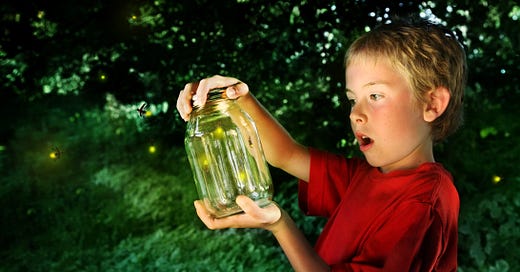Book Review: The Awakened Brain by Lisa Miller, Ph.D.
How Awe, Wonder, and Spiritual Awareness Can Help Protect Our Adolescents
Every once in a while, a book comes along that feels less like information — and more like a remembering of something we already know deep down.
The Awakened Brain by Lisa Miller, Ph.D., is that kind of book.
It offers powerful scientific proof for something many of us have felt intuitively:
Spiritual connection protects and strengthens the human mind.
And when it comes to children and adolescents — when it comes to guiding the next generation through anxiety, depression, and self-doubt — this truth is more important than ever.
What The Awakened Brain Is About
Lisa Miller, a clinical psychologist and researcher at Columbia University, blends cutting-edge neuroscience with years of practical experience to show us that the human brain is biologically wired for spirituality.
She defines the "Awakened Brain" as the part of our mental and emotional system that connects us to something bigger than ourselves — whatever words we might use for that (God, Spirit, Love, the Universe, inner knowing).
Through powerful research studies, personal stories, and clear, accessible science, Miller shows that when people — and especially adolescents — engage the Awakened Brain, they experience:
Lower rates of depression
Higher levels of resilience
Greater emotional regulation
A deeper sense of purpose and belonging
The Heart of the Message: Adolescents and the Power of Awe
One of the most striking and hopeful parts of The Awakened Brain is how directly it speaks to supporting adolescents — those navigating the wild, confusing in-between space of growing up.
Dr. Miller's research shows that adolescence is not just a time of chaos or risk.
It’s a biological window of opportunity for building a strong, healthy relationship with wonder, awe, and meaning.
When we guide young people to engage with experiences of awe — moments that feel bigger than themselves — their brains literally rewire toward greater strength, hope, and emotional wellbeing.
Dr. Miller's studies reveal that:
Adolescents with a strong personal spirituality are 35–75% less likely to experience clinical depression.
When both mother and child share a high level of spirituality, the child is 80% less likely to suffer from depression, even when accounting for factors like maternal depression and poverty.
Spirituality serves as a protective factor, reducing the risk of addiction and substance abuse among teens.
I mean, WOW !!
Key Insights for Helping Adolescents (and Ourselves)
1. Awe is Protective
Experiences of awe and wonder activate parts of the brain that quiet fear-based thinking and amplify creativity, empathy, and hope.
Encouraging young people to connect with awe — whether through nature, music, art, service, or moments of shared human connection — builds mental resilience at a biological level.
Wonder isn’t a luxury.
It’s a vital ingredient for a healthy, emotionally resilient brain.
2. Spiritual Awareness Reduces Depression
Miller’s studies found that adolescents who have a strong sense of spiritual connection (even a simple felt sense of “being part of something greater”) are 80% less likely to experience depression.
That statistic alone is stunning.
And this connection doesn’t have to come from organized religion (though it can). It’s about a personal sense of sacredness — the idea that life has meaning and that they themselves matter deeply.
3. Adolescents Need to Be Taught to Listen Inward
In a world that often shouts and distracts, adolescents need practice tuning inward — learning to listen to that quiet inner knowing.
Miller offers gentle ways to invite this, like:
Reflective questions ("When have you felt most alive?")
Journaling about moments of awe or gratitude
Quiet time in nature
Mindful noticing of beauty or kindness in daily life
It’s not about giving young people answers.
It’s about giving them permission to notice and trust their own deep experiences.
4. Relationships Matter
Spiritual connection often grows strongest in relationships of trust.
When adults create safe spaces for wonder, mystery, and open conversation — without judgment or forced answers — adolescents feel freer to explore their inner lives.
Simple questions like:
"What feels meaningful to you today?"
or
"Where did you notice something bigger than yourself this week?"
can help build those bridges.
Why This Matters (Now More Than Ever)
The rates of anxiety, depression, and despair among young people have skyrocketed. Our culture often pushes achievement, appearance, and endless comparison — but offers very little space for mystery, depth, or spiritual nourishment.
The Awakened Brain reminds us that adolescents are not broken.
Their brains are hungry for meaning — and when we help them find it, even in the smallest ways, we help them build lifelong mental health and resilience.
They don’t need perfection.
They don’t need certainty.
They need space for awe.
Final Thoughts: Why I Recommend The Awakened Brain
Reading this book made me realize that wonder isn’t something we grow out of — it’s something we must keep growing into.
If you are a parent, a coach, a therapist, or simply someone who cares about the next generation, The Awakened Brain offers both inspiration and concrete guidance.
It shows us that there is hope — that we can protect and nurture young hearts and minds, not by shielding them from pain, but by anchoring them in something deeper.
Spiritual connection isn't a "nice-to-have."
It’s a biological, emotional, and psychological lifeline.
Wonder is the medicine.
And awe is the gateway.
If you're looking for a roadmap to help yourself — and the young people you love — walk through anxiety, fear, and depression into something bigger and freer, start with this book.
It’s a gift, a guide, and a gentle call home.




